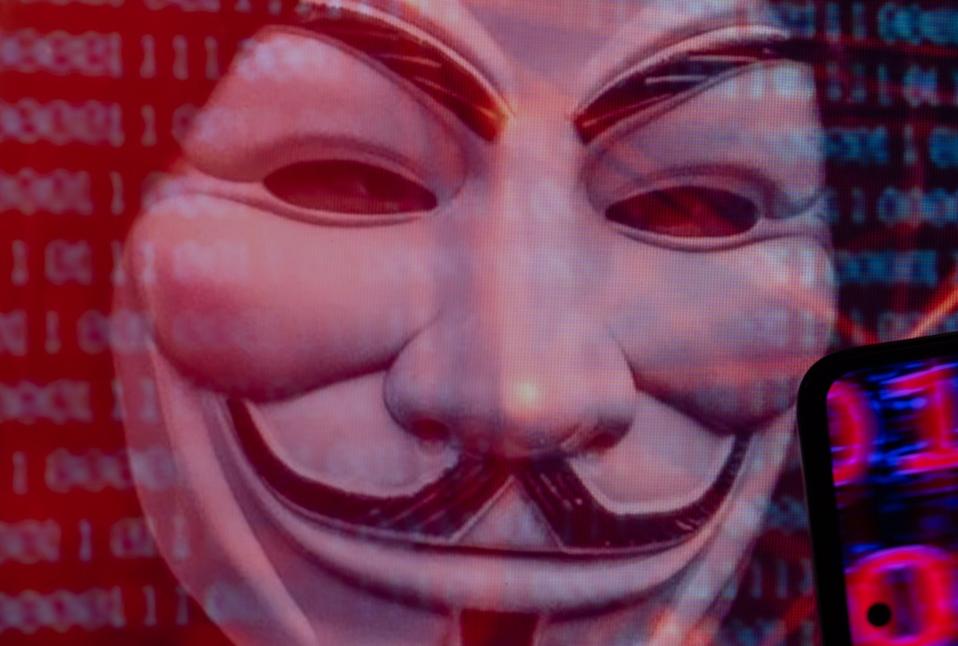Updated: Republished on April 18 with further analysis on contents of data cache.
The Anonymous PR machine is in full flight once again, claiming a new cyberattack on Russia “in defense of Ukraine.” The hacking collective has released a cache of some 10 terabytes, it says, which includes “data on all businesses operating in Russia, all Kremlin assets in the West, pro-Russian officials, Donald Trump, and more.”
Delete All Texts On Your Phone If You See These 2 Words
These Anonymous hacks don’t have the same impact as in the past, potentially because there have now been so many. And Cybernews reports that “from what files have been examined so far, the overall consensus seems to be that the leaked info is simply not that exciting, and apparently not that secret.” But it will generate headlines — which is the point — and there will be plenty of analysis on the data cache, including the Trump file and the even more intriguing “Domino’s Pizza” file.
Unsurprisingly, the Anonymous claims have been largely debunked, albeit some of what’s included in the cache — which is nowhere near 10 terabytes in size — might be useful to Ukraine’s armed forces. Per The Kyiv Post, “in March 2024, Ukraine’s Defense Intelligence (HUR) claimed a successful hack into Russia’s Ministry of Defense’s database. It said it obtained data that helped the agency establish the identity and structure of the Russian Armed Forces.”
At the time, Ukraine’s intelligence agency posted on Telegram that “the analysis of the obtained data also helped to identify the generals, other high-ranking managers of the structural units of the Ministry of Defense, as well as deputies, assistants, specialists — all those who used software for electronic document management called ‘bureaucrats’.” It’s possible that this leaked data contains more of the same.
While this highlights that even a collection of open source intel can be useful if collated and provided to those who can use it, it doesn’t add any credence to Anonymous’ claims. In reality, there will be little surprise that Russian officials are allegedly corrupt or that they have deep ties to the West. As one analyst notes, “mostly the information in the archive is specific to individual companies in Russia with folders for them and random PDFs for each company. This archive may be useful to the UKR armed forces since there are hundreds of PDF on defense companies in Russia.”
Posting on BlueSky, DDOSecrets’ Emma Best issued a scathing riposte to Anonymous. “Claims impossible data without explanation. Releases less than 2% of what they say they have. Data looks like a scrape of existing releases. High quality folders like ‘China government site’ and ‘Dominoes pizza’…. Do I even need to say it?”
We await any further analysis of the data to see what might be included, and we have certainly seen nuggets of intel buried in such archives before. Part of the problem is that it’s unclear what information is being searched for. Russia’s role as a rogue state is well established now, especially as viewed from Europe, as its Ukraine campaign continues.
Again unsurprisingly, blue chip international names appear in the data, as well as NGOs operating in the region. But as one Redditor notes, several of those who have sifted through the data “are reporting that this is increasingly looking like it’s bunk. Don’t download the files. I would avoid anonymous’ PR website as it’s directing to the mediafire link that was being distro’d widely earlier in the day just in case it’s malware.”
For now, you can ignore this as a mid-week distraction. But we will clearly return to the story if and when anything more interesting turns up in the data.
Google Pixel’s Unbeatable Upgrade—Bad News For Samsung
And maybe we will. As another Redditor put it, “at the end of the day, let’s not pretend what they’re doing here isn’t a high tech version of a looting: they pound on some weakness, get in, grab as much as they can… And when they get out, they either got garbage bags of Pringles and lotion or Rolexes.”
Thus far, this seems more Pringles than Rolexes, albeit with some awkward questions for the Russian officials and Western firms named in the data cache.

